

Capability Maturity Model Integration. Capability Maturity Model Integration (CMMI) is a process improvement training and appraisal program and service administered and marketed by Carnegie Mellon University and required by many DOD and U.S.
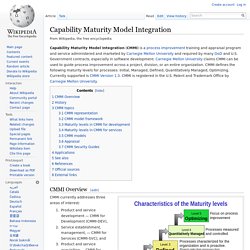
Government contracts, especially software development. Carnegie Mellon University claims CMMI can be used to guide process improvement across a project, division, or an entire organization. Under the CMMI methodology, processes are rated according to their maturity levels, which are defined as: Initial, Repeatable, Defined, Quantitatively Managed, Optimizing. Currently supported is CMMI Version 1.3. CMMI is registered in the U.S. Overview[edit] Characteristics of the Maturity levels.[1] Session Details. WIHI is an exciting "talk show" program from IHI, originally envisioned by Don Berwick, MD, former President and CEO, Institute for Healthcare Improvement.
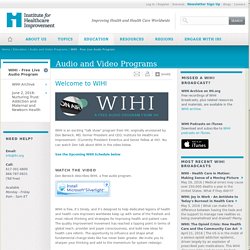
(Currently President Emeritus and Senior Fellow at IHI). You can watch Don talk about WIHI in the video below. WIHI is free, it’s timely, and it’s designed to help dedicated legions of health and health care improvers worldwide keep up with some of the freshest and most robust thinking and strategies for improving health and patient care. The quality improvement movement has reached a tipping point in terms of global reach, provider and payer consciousness, and bold new ideas for health care reform. The opportunity to influence and shape what fundamental change looks like has never been greater.
The issues may be complex, but the format of WIHI is simple. Your host is IHI’s Madge Kaplan, who brings a wealth of experience to WIHI from her years reporting on health care for public radio. Crisis Management. Respectful Management of Serious Clinical Adverse Events. How to cite this paper: Conway J, Federico F, Stewart K, Campbell MJ.
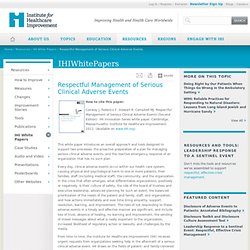
Respectful Management of Serious Clinical Adverse Events (Second Edition). IHI Innovation Series white paper. Cambridge, Massachusetts: Institute for Healthcare Improvement; 2011. (Available on www.IHI.org) This white paper introduces an overall approach and tools designed to support two processes: the proactive preparation of a plan for managing serious clinical adverse events, and the reactive emergency response of an organization that has no such plan. Every day, clinical adverse events occur within our health care system, causing physical and psychological harm to one or more patients, their families, staff (including medical staff), the community, and the organization.
From time to time, the Institute for Healthcare Improvement (IHI) receives urgent requests from organizations seeking help in the aftermath of a serious clinical adverse event. The development of this white paper was motivated by three objectives: Eleven Worthy Aims for Clinical Leadership of Health System Reform, September 14, 1994, Berwick 272 (10): 797. Clinicians ought to be playing a central role in making the changes in the health care system that will allow the system to offer better outcomes, greater ease of use, lower cost, and more social justice in health status.
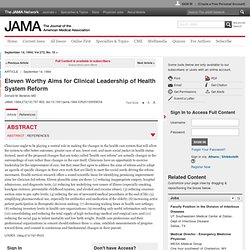
Instead, most of the proposed changes that are today called "health care reform" are actually changes in the surroundings of care rather than changes in the care itself. Clinicians have an opportunity to exercise leadership for the improvement of care, but they must first agree to address the aims of reform and to adopt an agenda of specific changes in their own work that are likely to meet the social needs driving the reform movement. Health services research offers a sound scientific basis for identifying promising improvement aims for clinician-led reform.
Office of Safety and Quality in Health Care (OSQH) » Clinical governance pillars » Clinical governance self assessment tool (Word 34KB) What is clinical governance?
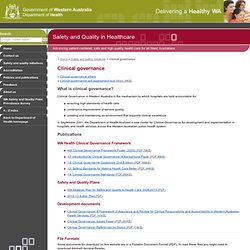
Clinical Governance in Western Australia is the mechanism by which hospitals are held accountable for: ensuring high standards of health care continuous improvement of service quality creating and maintaining an environment that supports clinical excellence In September 2001, the Department of Health finalised a new model for Clinical Governance for development and implementation in hospitals and health services across the Western Australian public health system.
Implementing clinical governance: turning vision into reality. Clinical governance was the centrepiece of an NHS white paper introduced soon after the Labour government came into office in the late 1990s.1 The white paper provides the framework to support local NHS organisations as they implement the statutory duty of quality, which was placed on them through the 1990 NHS act.2 Clinical governance provides the opportunity to understand and learn to develop the fundamental components required to facilitate the delivery of quality care—a no blame, questioning, learning culture, excellent leadership, and an ethos where staff are valued and supported as they form partnerships with patients.
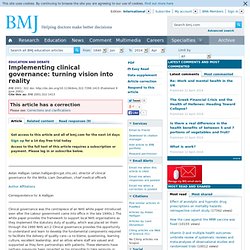
These elements have perhaps previously been regarded as too intangible to take seriously or attempt to improve. Summary points. Clinical governance. Clinical Governance. Scheduling ER Corporate (Pty) Ltd currently delivers turnkey administration and training services to the entire ER Group as well as various consultative and administration services to other groups.

Scheduling (or rostering) is a key function of ER Corporate (Pty) Ltd. Our dedicated department currently schedules over 15000 hours of doctor time every month and manages the schedules of more than 200 doctors 2 months in advance. The scheduling process is a complex one that has been mastered by our team of dedicated individuals. Clinical governance. Clinical governance is a systematic approach to maintaining and improving the quality of patient care within a health system.
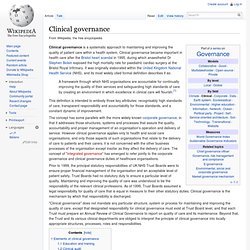
Clinical governance became important in health care after the Bristol heart scandal in 1995, during which anaesthetist Dr Stephen Bolsin exposed the high mortality rate for paediatric cardiac surgery at the Bristol Royal Infirmary. It was originally elaborated within the United Kingdom National Health Service (NHS), and its most widely cited formal definition describes it as: A framework through which NHS organisations are accountable for continually improving the quality of their services and safeguarding high standards of care by creating an environment in which excellence in clinical care will flourish.[1] This definition is intended to embody three key attributes: recognisably high standards of care, transparent responsibility and accountability for those standards, and a constant dynamic of improvement.
Elements of clinical governance[edit] Clinical Governance. Mediclinic is committed to providing quality healthcare and aspires to be regarded as the most respected and trusted provider of hospital services by patients, doctors and funders of healthcare.
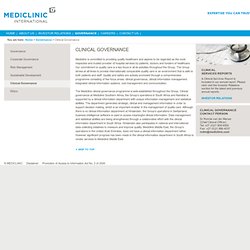
Our commitment to quality care is a key focus in all its activities throughout the Group. The Group strives at all times to provide internationally comparable quality care in an environment that is safe to both patients and staff. Quality and safety are actively promoted through a comprehensive programme consisting of five focus areas: clinical governance, clinical information management, integrated clinical information systems, cost management and communication. Clinical Governance - Home Page.
Clinical Governance. Clinical governance is a framework that guides healthcare organisations in continuously improving service quality.
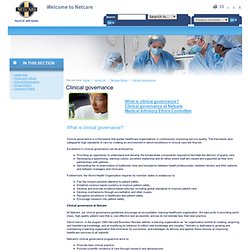
The framework also safeguards high standards of care by creating an environment in which excellence in clinical care will flourish. Excellence in clinical governance can be achieved by: Providing an opportunity to understand and develop the fundamental components required to facilitate the delivery of quality care. Developing a questioning, learning culture, excellent leadership and an ethos where staff are valued and supported as they form partnerships with patients. Clinical governance: guidance documents : Department of Health - Public health. Clinical governance reporting processes Published: 15 November 2002 This guidance identifies for NHS trusts, new clinical governance reporting frameworks and processes and asks chief executives and NHS trust boards to address these as part of their clinical governance responsibilities. Clinical governance reporting processes Clinical governance in community pharmacy: guidelines on good practice for the NHS.
9780443071263. Patient safety key documents : Department of Health - Public health. Journal clinical governance issn. Implementing clinical governance. Clinical Governance and Health Reform.